On a Zoom webinar held Tuesday, October 24, Associate Vice President for Safety and Security Eric Heath addressed the recent series of off-campus armed robberies, discussed ongoing investments in safety infrastructure, and mentioned the possibility of further scaling back the Lyft Ride Smart program amid a deluge of student and parent questions.
He was joined by President Paul Alivisatos, Dean of Students Michele Rasmussen, Dean of the College Melina Hale, and Vice President for Communications Paul Rand.
The webinar came amidst rising student and community anxiety over crime in Hyde Park. Recent armed robberies and paintball attacks have led to widespread discussion across a range of forums, with many calling for greater transparency and criticizing the University for decreasing the number of Lyft passes provided to community members.
Crime Awareness and Lyft Ride Smart Program
“In the city, we’re seeing a 25 percent increase in overall crime and a 25 percent increase in robberies,” Heath said, contextualizing the wave around campus as part of a Chicago-wide trend. He spoke directly about the spike in Hyde Park-based crimes. “Really the change in the fall tends to be just an influx of new people. It’s about educating and re-educating all the new students, families, faculty, staff, and community members that come into our area.”
Rasmussen elaborated on the importance of awareness and safety education. “Try to just get in the mindset of being prepared and vigilant all the time and not let your guard down, especially if you’re walking around in an urban environment when it’s darker… We want [our students] to be aware and paying attention to their surroundings by not being too plugged in with their AirPods or looking down at their phone while they’re walking around in the streets.”
Several audience members called for an expansion of the Lyft Ride Smart program in light of the recent nighttime robberies. Currently, the program gives all enrollees up to seven free $10 rides a month, compared to the 10, $15 credits a month last academic year, in a geofenced area that includes Hyde Park and part of the Woodlawn neighborhood, between 5 p.m. and 4 a.m.
Rasmussen said the program “was not so much suggested to us by students as a response to crime. It was suggested to us by students as a late-night alternative, especially on weekends, to shuttles or walking to get from point A to point B, particularly off-campus. It was never intended to be a standalone transportation system, to replace our shuttle system, to replace our CTA bus routes, but rather more of a complement.”
Despite Rasmussen’s claims, the University has used the Lyft program as a response to crime in the past. When it was first launched in September of 2021, passes could only be used on Thursday, Friday, and Saturday nights. But after a wave of violent crime in November of 2021, including the murder of graduate Shaoxiong “Dennis” Zheng, the program was extended to every night of the week. While initially marketed as temporary, the expansion was eventually made permanent.

Heath hinted at plans to further scale back or eliminate the Lyft program altogether. “We’re considering exploring alternatives to a Lyft program that provides point-to-point service, maybe even more so than what Lyft currently provides, but in a manner that is both environmentally and economically sustainable, because what has shifted with our Lyft program is the influx of vehicles that has created a lot of challenges and concerns for our greater community.”
Despite the University’s concern for the environmental sensibilities of the community, there have been no organized calls for the Lyft program to be adjusted because of emissions.
In a statement to The Maroon, the UChicago Environmental Justice Task Force lambasted the University for citing environmental concerns while not taking action on initiatives that students have advocated for years.
“It’s hard to commend the University for their environmental and community concerns when their concern is clearly manufactured to cover for their aggressive spending cuts and corporatization. If the University actually cared about the environment it would (1) Divest from fossil fuels (2) Invest in proven and effective partnerships like the CTA bus program that benefit the community, the environment, and students. If the University actually cared about the broader community it would (1) Stop over policing the community, which carries its own environmental costs (2) Stop making financial decisions like investments and land purchases with no transparency (3) Stop displacing Black residents on the South Side.”
During the webinar, Rasmussen addressed the difficulty of providing safety assurances to the campus community. “Everyone, including our students, have different thresholds for where they feel safe. Some students are extremely comfortable in an urban environment, and others a little bit less so, and that’ll come with time. Unfortunately, there is no set of guaranteed behavior or actions that will 100 percent prevent you from becoming a crime victim. We also don’t want to frighten students into not getting out of campus and exploring Chicago,” she said.
Details of the Robberies
According to Heath, in the last three weeks, several University students fell victim to a series of armed robberies, which primarily occurred north and east of campus. “In the span of three weeks, we believe around 10 robberies were likely related to one particular group of suspects, who over the course of multiple weekends were stealing vehicles, committing a series of crimes, and then dropping the vehicles,” he said.
The University of Chicago Police Department (UCPD) leveraged its system of license plate readers to analyze distinct patterns used by the suspects. “In the three patterns that we had, we were able to actually review video footage and by the second weekend, have a really good understanding of what vehicles were being used in the second pattern, and unfortunately chase those vehicles,” Heath said.
UCPD officers recovered the second vehicle used and obtained the license plate of the third vehicle. “The very next night when [the third vehicle] returned to that area, we located the vehicle, chased the vehicle, and were able to apprehend one juvenile suspect who we turned over to the Chicago Police Department.”
Heath confirmed the age of the juvenile suspect and remarked on the complexity of the crimes. “These crimes are complicated. They are fast and they’re quick. Even in a situation like this, when a 13-year-old juvenile gets arrested, the reality is even at 13 years old, they’re extremely street savvy.” He also emphasized the atypical nature of the crimes, citing unreleased UChicago Crime Lab data. “Where we had the robberies most recently in the last couple of weeks isn’t where the historical crime patterns exist for our robbery hotspots in our patrol area.”
UCPD Efforts and Challenges
All the crimes were committed off-campus, and Heath commented on the challenges posed by the UCPD’s large coverage area. “Our extended patrol area is quite large geographically. It’s about four and a half square miles. We have an extended patrol area that probably dwarfs all of our peers geographically.” He emphasized that areas beyond the northern and southern campus boundaries are primarily patrolled by the Chicago Police Department. “UCPD provides support to the Chicago Police Department. We’re kind of like an additional eyes and ears.”
Heath also cited the lack of city-provided camera coverage in the extended patrol area as a challenge. “While we have a robust technology situation on our campus, off-campus, we’ve never really had that broad coverage. In the last two years, we have donated a significant amount of money to the city to improve their own camera infrastructure. Over the last couple of weeks, in fact, they have started installing all of those cameras.”
Security Alerts
Several students submitted questions calling for more immediate security alerts, criticizing the University’s lack of communication and transparency. Heath emphasized that under the Clery Act, the University is only required to communicate on-campus crime. He defined “on-campus” as “property that the university owns or controls for the purposes of higher education or in support of education, as well as public property, streets, and sidewalks that are immediately adjacent to that property. Anything else is considered off-campus.” The one mugging-related security alert sent to students discussed an incident on 58th Street, which is considered on-campus according to the UCPD patrol map.
Heath added that the decision to restrict security alerts to on-campus crime was informed by community feedback. Prior to 2018, the university reported on- and off-campus crime via email security alerts. “The vast majority of the feedback was that there was way too much information. So we moved, based on the feedback, to an opt-in system to talk about off-campus crime.” He admitted that emailed security alerts are ineffective at notifying students quickly. “I realize that the 18-year-old students are probably not reading their emails at 11 o’clock at night. So we need to think differently about if there are different means and modes to produce and disseminate that information.”
Safety Measures and Infrastructure Enhancements
In addition to bolstering local camera capabilities, Alivisatos discussed widespread staffing enhancements. “Two years ago, we set into motion a large set of new investments to support your safety. For example, we are growing our police force substantially. To do that, we had to establish a new program for recruiting officers.” Heath added that “over the next coming weeks, we intend to double the actual coverage we have in the extended patrol area.”
This increase in staffing is part of a larger re-orientation of how the Department of Safety and Security views its role. “We switched our perspective of being a campus law enforcement agency into more of a forward-thinking agency that’s addressing urban-related crime. What has worked well on campus? What can we also extend in the area?”
Alivisatos also acknowledged community concerns regarding UCPD expansion. “We have to think about the balance of creating and improving safety while also not creating a police and security state.”
Alivisatos ended the call with a nod to UCPD. “I want to leave off by thanking our UCPD officers. They’re out there doing some incredible work.”
















Nathan Ohana / Oct 30, 2023 at 8:26 pm
Rasmussen’s answer on the Lyft program is really revealing. It makes no sense to say its “just” an alternative to get from A to B, it is used, and so prized by students, because other methods of transportation are inefficient at night, particularly for students living off campus. Lyft perfectly fills that need. If students felt comfortable walking back at night, they would. If the bus system (both CTA and UC bus) had well designed routes and higher frequencies, students would use it, but they don’t.
I do think, however, that having 10 dollars off per ride is preferred to 15. However, if the university cuts down on the program more without increasing route frequencies, would be catastrophic. It is unacceptable to be running these shuttles every 15-30 minutes for routes that go like 1-2 miles. If they are concerned with individual Lyfts on the streets, they could easily design a better bus system still with far fewer individual vehicles.